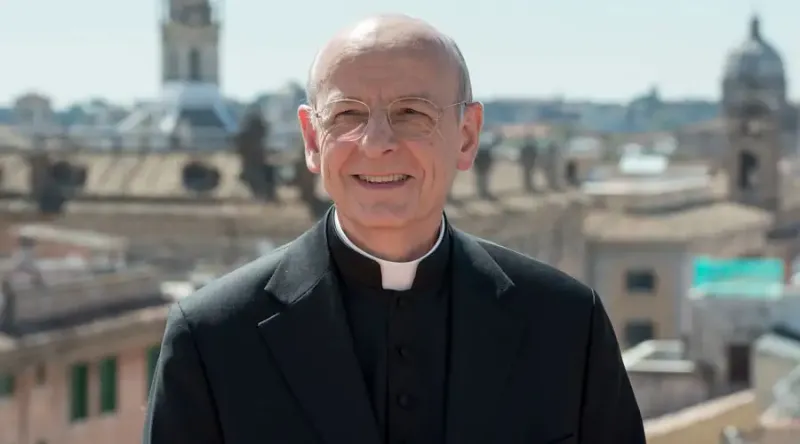
Denver Newsroom, Sep 12, 2022 / 16:00 pm (CNA).
The prelate of Opus Dei, Msgr. Fernando Ocáriz, has asked the members of the Catholic institution for their prayers for the reform process ordered by Pope Francis, which took effect Aug. 4.
“Continue to pray for the work that the pope has entrusted to us to adapt the Statutes of the Work to what is indicated in the motu proprio ‘Ad charisma tuendum,’” the prelate said in a message published Sept. 10.
“We have already started — in the General Council and the Central Advisory — the appropriate studies to carry it out,” he said.
“During the days spent in the Holy Land, I have kept you especially present in my prayer, knowing that I am accompanied by yours at the same time,” Ocáriz wrote.
What did Pope Francis order for Opus Dei?
On July 22, the Vatican published the apostolic letter in the form of a motu proprio titled “Ad charisma tuendum” (To safeguard the charism), whereby Pope Francis ordered a reform of Opus Dei.
Among the pope’s provisions are that the prelate who directs Opus Dei from now on will no longer be a bishop; the institution must adapt its statutes and present an annual report; and it will no longer answer to the dicastery for bishops but to the dicastery for the clergy.
Opus Dei explained that the decision that the prelate may no longer be a bishop is “an initiative and decision of the Holy See” to reinforce “the charismatic dimension” instead of the hierarchical dimension of the institution.
Ocáriz, 77, is not a bishop and, due to the pontifical document, will not be consecrated as such.
In a question-and-answer section of Opus Dei’s website in Spain, it states that this does not “directly introduce changes in the form of government of the prelature, nor in the relations of the prelature’s authorities with the bishops,” which means that it will continue to function as before.
By establishing that an annual report must be presented on the situation of the prelature and the development of its apostolic work, the previous regulation that required it every five years has been changed.
The pontifical document also requires the adjustment of the statutes, which must be proposed by Opus Dei itself and must then be approved by the competent Vatican bodies.
What is Opus Dei?
Opus Dei is a personal prelature, the only one in the Catholic Church. It was founded in Spain by St. Josemaría Escrivá de Balaguer in 1928 and is present in 68 countries.
The overall head of the prelature is the prelate, who is appointed by the pope and who governs the institution as a jurisdiction, similar to a bishop who governs his diocese or assigned territory.
Opus Dei means “Work of God” in Latin, which is why its members usually refer to it as “The Work.” Its special emphasis or charism is sanctification through daily work.
In Opus Dei there are priests, celibate lay persons who are called numeraries and associates, and supernumeraries who are married members.
Opus Dei is not a sect.
This story was first published by ACI Prensa, CNA’s Spanish-language news partner. It has been translated and adapted by CNA.
If you value the news and views Catholic World Report provides, please consider donating to support our efforts. Your contribution will help us continue to make CWR available to all readers worldwide for free, without a subscription. Thank you for your generosity!
Click here for more information on donating to CWR. Click here to sign up for our newsletter.




Ad Charisma tuendum
Opus Dei
Habemus Papam
Motu Proprio
Domine non sum dignus ut intres sub tectum meam sed tantum dic verbo et sanabitur anima meam.
Charisma is a rare gift. Keeping the charismatic dimension alive supports world building. Opus Dei has a mission to embark upon. All the best to Msgr. Fernando Ocáriz and his fellow charismatic team mates. God bless.
Pope Francis has finally corrected the canonical anomaly allowed by St. Pope John Paul II that is the Opus Dei. This correction though is not comprehensive enough, Opus Dei should cease to be a prelature that made it elitist and be just like any organization of clergy and lay like the Legionaries of Christ and Regnum Christi. This is a similar action to the correction earlier made by Pope Francis to the liturgical anomaly introduced by Pope Benedict XVI in Summorum Pontificum by rescinding it in Traditionis Custodes. This Pope is indeed good at righting the wrong for the good of the church and the greater glory of God.
Lest we forget – in the book ‘The Davinci Code’ the guy who goes hither thither and yon killing the people who have figured out the Church’s nefarious 2000 year old plot is an albino monk who is a member of Opus Dei.
I skipped the movie.
As a Cooperator for the last 12 years, I have lived a lifestyle in-accordance to the teaching of Saint JoseMaria. I have been blessed with weekly circles and monthly meditations, Mass, confession and a great joy to be around men that share my love for the Lord. It has been a wonderful way of life. I have followed Pope Francis attack on OD and continue to feel confused and very upset. I can share many thoughts but I always come back to my initial thought; how can this Pope change the directive of Saint John Paul II. It is sad that Pope Francis does not see the big picture and benefits of OD. Last few years has been terrible for the church as the flock has not returned from COVID. OD has been steady and strong. SJM is always with me and I will do my best to continue to pray for Pope Francis that he sees the good OD has offered those seeking more focus on our faith.